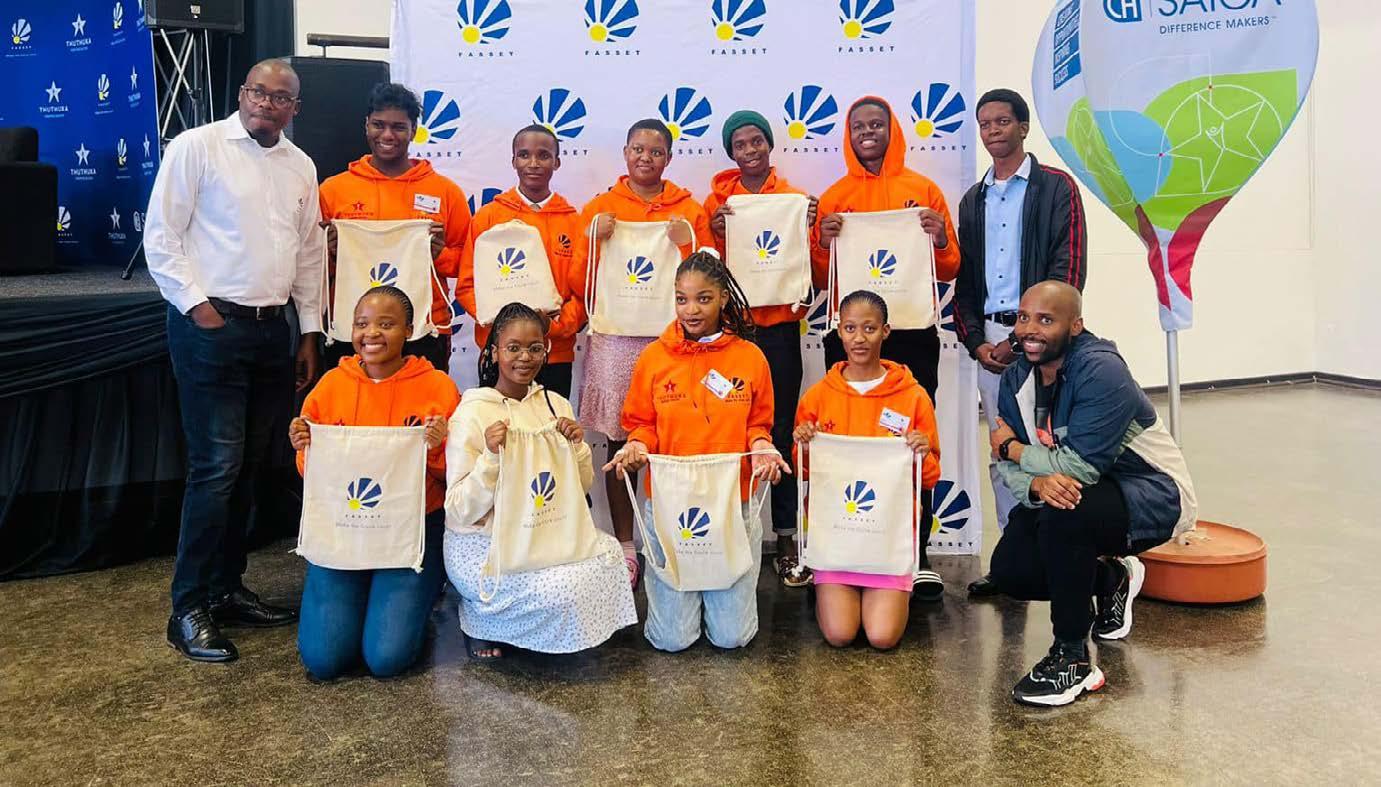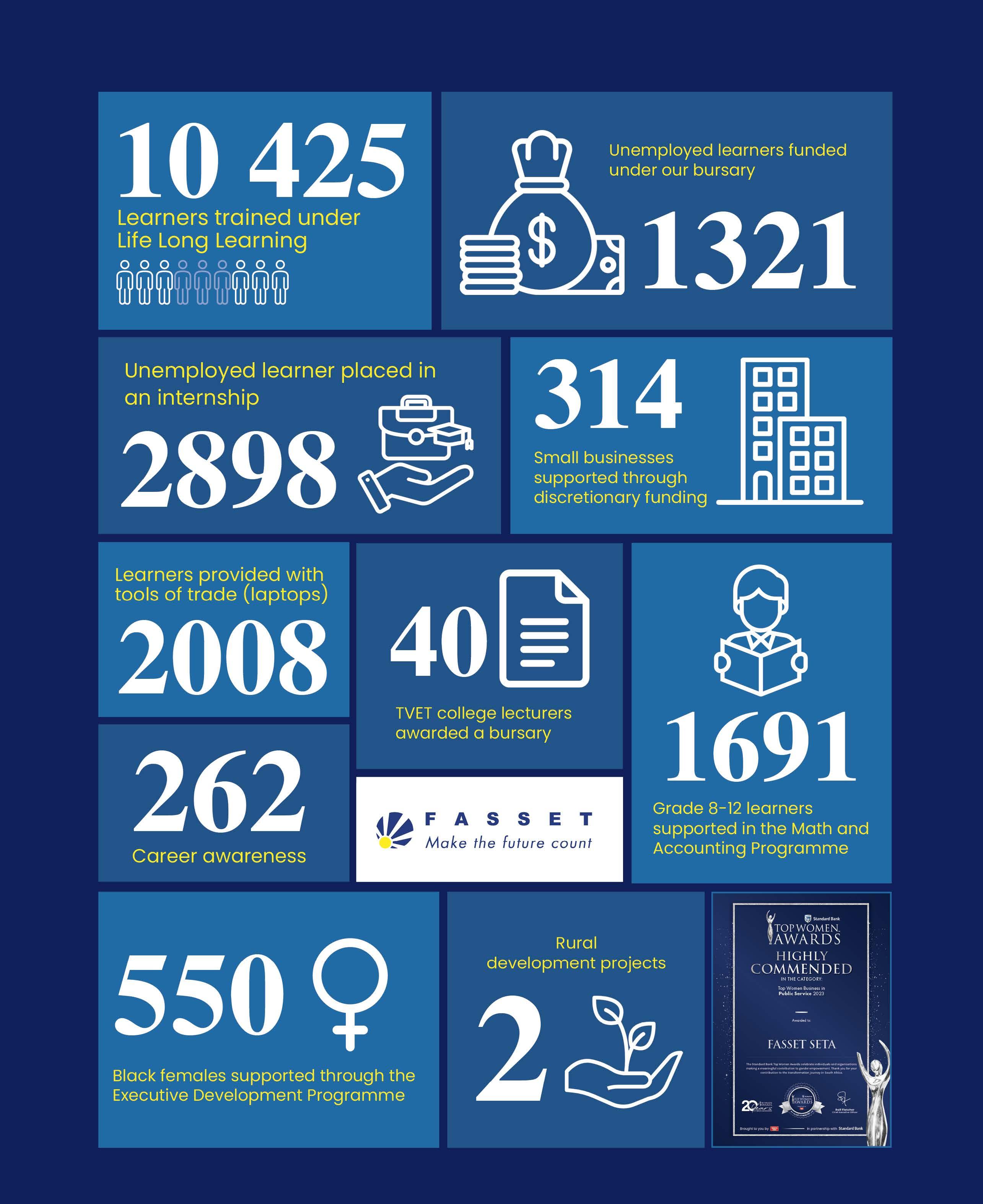
10 minute read
Ayanda Mafuleka - Facilitating Job Creation, Building a Legacy
FASSET is the Finance and Accounting Services Sector Education and Training Authority which is the largest employer of people with financial management, accounting, and auditing skills in South Africa.
As a skills development driver, FASSET’s mandate is to help level the playing field through transformative initiatives to reduce inequality and bridge skills gaps, with a particular focus on the youth to equip them with skills which are vital in the world of work.
FASSET is known for the impressive programmes which facilitate job creation and prepare the youth for the workplace, ensuring that with all its programmes and initiatives, the organisation meets the mandate of the government’s strategic frameworks and policies. FASSET funds a programme pipeline that supports candidates who will one day enter the emplyment pool through bursaries, learnerships and internships as well those already in the employment pool through Executive Development, Entrepreneurship and Professional Body programmes.
As a SETA, FASSET collaborates with stakeholders from both public and private sectors to design and implement programmes that empower learners to thrive in a dynamic and competitive landscape, thus ensuring its interventions contribute meaningfully to economic growth and job creation.
CEO, Ayanda Mafuleka provides a deep dive into the organisation’s praxis and her legacy. Ms Mafuleka is also supported by the CFO, Mr Zakariya Alli, the CIO, Mr Makabongwe Siziba, the CSE, Ms Nokulunga Mthombeni, and the two FASSET Programmes Managers, Ms Mamarothi Mathibe and Mr Khulekani Khoza.
The Fasset SMME Success Story
Under the Women Creating Wealth Programme, we have partnered with the Graça Machel Trust to develop 600 South African entrepreneursthe majority of whom come from the financial services sector. FASSET, along with strategic partners, has delivered SMME support programmes across various industries, equipping entrepreneurs and aspiring entrepreneurs with skills such as financial literacy.
Professional bodies within the finance and accounting sector have been vital in ensuring that the skills transfer within our programmes responds to the needs of the sector as well as keeping pace with global trends.
Cornerstones Of A Legacy

The Women’s Executive Development Programme which is facilitated through the International Women’s Forum of South Africa (IWFSA), Duke Corporate Education, and Wits Business School aims to enhance the business acumen and leadership skills of women at middle and executive management levels. With the goal of impacting 2 000 women by 2025, the programme has already seen great strides with its beneficiaries providing impressive feedback relating to how the programme has influenced their confidence and presence within the corporate space.
Another milestone was achieved through our partnership with TVET and CET colleges where we launched fully outfitted state-of-the-art ICT Hubs at 45 TVET colleges and supported the nine CET Colleges with mobile classrooms. The support provided to the institutions in turn impacts the learners and educators.
Most Memorable Moments
My engagements with FASSET benefactors are my most memorable moments, learning how our programmes have impacted their livelihoods and created a better base for the type of future they wish to develop for themselves. The stories are highly inspirational.
One worthy of mention is from the Community Education Training Colleges - in 2022, FASSET partnered with KZN CET and the stipends provided to the learners were used, by some, to open businesses. Another is from a beneficiary of the Women’s Executive Development Programme where a beneficiary felt liberated by the programme when she was on the brink of suicide due to challenges faced by women in the corporate world.
Entrepreneurial skills teach learners to have a growth mindset, to think critically and develop problem solving skills, they encourage creativity, self-confidence and independence from an early age, and in my opinion financial literacy should be part of the curriculum from as early as primary school.
Zakariya Alli, Chief Financial Officer (CFO)

Q: Please Share With Us How You Manage Financial Strength For FASSET
The financial strength of FASSET is driven by the governance structures and the people that continuously maintain a good control environment. Consistent and regular reporting allows FASSET to continuously be open to improvement and recommendations.
Q: How Do You Ensure FASSET Gets Clean Audits and Aligns With National Treasury In Terms of Legislation and Government
Having a good team driving compliance and controls is the key to maintaining a clean audit. A clean audit does not only come from the finance unit , but all units within the organisation contribute to a clean audit. Having alignment and understanding between all units is key to the success of FASSET.
Q: Please Describe How Integrity Was An Integral Facet in FASSET's Journey To Excellence
Policies and procedures give structure to an organisation, but the real success lies in the integrity of the people in the organisation to uphold those policies and procedures. At FASSET we promote an ethical culture and integrity is a cornerstone of this culture.
Q: How Do You Ensure Diversity, Equity and Inclusion Are Part of FASSET's DNA?
FASSET is an organisation that drives transformation. Through this drive, the culture of diversity, equity and inclusion is ingrained into the organisation.
Makabongwe Siziba, Chief Information Officer (CIO)

Q: How Have The Developments in Technology Impacted Your Role as CIO?
The emerging technologies such as blockchain, AI, data analytics and robotic process automation are reshaping the finance and accounting sector. As a result, my role has evolved to become a key strategic business leader with my role of technologist being secondary within the organisation.
Q: How Do You Ensure Service Delivery to Stakeholders Is Seamless?
We adopted Microsoft Azure cloud computing technology, which changed the approach to and mindset around technology. This brought significant opportunities for online business services availability while mitigating the risks associated with cloud technologies. ICT continues to engage with the core business to optimise business processes to cater for the demands of FASSET’s external stakeholders.
FASSET is also exploring collaboration opportunities with other SETAs through the SETA Shared Services Model for Learner Management Systems. The focus is on integrating the existing Management Information System to improve our internal processes and decision-making.
Q: What is ICT Doing to Ensure All Processes Are in Place?
ICT is prioritising the development and implementation of digital strategies to establish sound information management systems and promote effective management of technology and information as a strategic driver to achieve business objectives.
Digital skills development has been prioritised for the ICT team, which has access to online digital platforms for targeted self-driven development. The team also attends summits to keep abreast with latest technology developments while high-performing individuals are incentivised through financial and non-financial rewards.
Nokulunga Mthombeni, Corporate Service Executive (CSE)

Q: How Long Have You Been In Your Role as CSE and What Have Been Your Most Memorable Moments?
I have been with FASSET in the role of CSE for three years. This role is responsible for overseeing some support services components (Human Resources Management, Communications and Stakeholder Engagement, Facilities and Records Management) which are crucial for the necessary support and infrastructure that enables the core business function to operate optimally for overall organisational success. Reflecting on the most memorable moments a lot comes into mind, like remarkable improvement in talent acquisition and recruitment, performance management, successful negotiation with social partners (union) etc.
It is noteworthy that the outcomes of strategic and deliberate transformation of the organisational culture with an objective of fostering a healthy/conducive and inclusive workplace has borne fruits. Initiatives like establishment of women’s and men’s fora, choir, netball, soccer, recognition and rewarding of good performance evidenced by the organisational Inaugural Service Excellence Awards in 2023. Improved staff engagement and the provision of feedback has enabled this achievement.
Q: How Important Is It, In Your Opinion, To Nurture Relationships With All Stakeholders, Both Internal and External?
Nurturing relationships with all stakeholders, both internal and external is crucial for any organisation. My role requires an understanding of the various stakeholder levels and their touch points. Each of these stakeholders requires different communication styles and approaches and, therefore, it is key for me to take note of this and provide the necessary guidance.
Sharing information timely and openly to stakeholders and consistently providing opportunities to have everyone share their thoughts and be considered in the decision making process plays a major role. The landscape of working is dynamic and forever evolving and it highlights the importance of continuously making ourselves great business partners.
Khulekani Khoza and Mamarothi Mathibe, Programme Managers
Q: Please Share With Us Some of The Core Programmes At FASSET

FASSET’s main focus is to contribute towards alleviation of the unemployment rate among the youth and contribute towards the growth of the South African economy through skills development initiatives. The initiatives are two-fold:
1.1 - Creating a new pipeline to the finance sector by upskilling individuals on the skills that are scarce and critical as we are of a view that if we focus on the skills that are scarce and critical, the individuals will have high chances of securing employment.
1.2 - Training the existing workforce in the industry to acquire relevant and future skills in order to boost the economy and reduce the chances of becoming obsolete, thus ensuring that we don’t contribute to the current unemployment rate.
The programmes affected are as follows:
Bursaries for both unemployed and employed
Professional body programmes
Internship programmes
Entrepreneurial programmes
Digital skills programmes
Maths, English and Accounting programmes
Learnerships
Leadership programmes
Q: How Are The Core Programmes Implemented strategically?
FASSET has its own strategic priorities that guide the approach in implementation of these programmes. Our main priority is transformation which speaks to assisting individuals that are classified as historically disadvantaged, including youth, people living with disabilities and even extending access to individuals that are in rural areas and townships.

Q: One of FASSET’s Priorities Is Rural Reach To Ensure Inclusion Of Rural Demographics In Its Offering – Please Unpack Your success Stories
We have a partnership with Nkungumathe NPO, based at Nkandla on the northern side of KZN, to find placements for about 800 students from across HETs, TVETs & NSC institutions to the value of R46 953 050, plus tools of trade which amounts to almost R60 000 000.

This partnership has drawn attention from the Premier’s office in the province, various departments responsible for learning (e.g. DoH, DBE, DHA, DARD, CoGTA as well as other state agencies such as Ithala Bank) and some of the big districts were able to place the learners (the Zululand, uThukela, King Cetshwayo, Majuba, Mkhanyakude, uMzinyathi municipalities and the eThekwini metro). More than 60% of the young people were given permanent posts. This has improved not only their own livelihoods but their families as well.
FASSET's Reported Impact For 2023/2024











